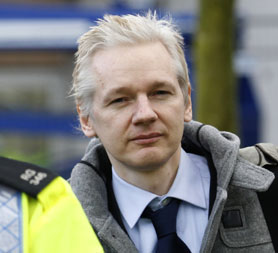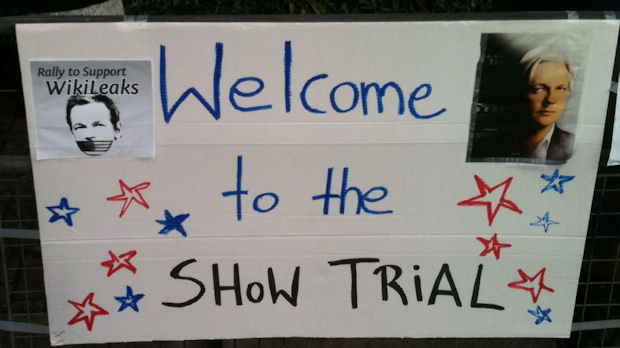WikiLeaks: Julian Assange ‘could be sent to Guantanamo Bay’
The legal team behind WikiLeaks editor Julian Assange say they fear he could end up at Guantanamo Bay if he is extradited to Sweden to answer sexual assault allegations.

After spending Christmas in a Norfolk farmhouse, the man behind WikiLeaks got up at 3am this morning to return to London and the full glare of the media spotlight.
Julian Assange, 39, the founder of the data leaking website, is accused of sexually assaulting two women during a visit to Stockholm in Sweden in August. He denies any wrongdoing and insists the allegations are “politically motivated”.
He appeared at Belmarsh Magistrates in south east London, sitting at Woolwich Crown Court, to confirm his personal details before being released again on conditional bail by judge Nicholas Evans who also agreed he could stay at the Frontline Club in west London before the next hearing on 7 February.
There is a real risk that, if extradited to Sweden, the US will seek his extradition and/or illegal rendition to the USA. Assange legal team
The club was set up by Mr assange’s friend, journalist Vaughan Smith, who invited the WikiLeaks editor to stay at his home during the Christmas break.
After the hearing Mr Assange told a large group of reporters and cameras that he was “happy” with the outcome of the 10-minute appearance.
He said: “Our work with WikiLeaks continues unabated and we are stepping up our publication of materials relating to cablegate and other materials.
“This will shortly be occurring through our newspaper partners around the world, big and small newspapers and human rights organisations.”
Guantanamo fears
Mr Assange’s defence team say they believe there is a “real risk” that if he is sent to Sweden he could be extradited on to the US, after which he could be detained in Guantanamo Bay – where terror suspects are detained – or even face the death penalty.
The claim has been made in a “skeleton” argument published online today by his lawyers. The document focuses on the allegations of one of his accusers, including a text message in which the woman alleged she was “half asleep” at the time of the claimed assault.
Text messages at heart of Assange case
The document published at fsilaw.com reads: "There has not been full disclosure of the documents in the investigative file in this case. In particular Mr Assange has not been provided with copies of SMS messages sent by the Complainants in which Ms XXXX says that she was "half asleep" at the time of the sexual intercourse."
Mr Assange’s lawyers say that extraditing him to Sweden could breach Article 3 of the European Convention on Human Rights (ECHR), which bans torture.
They wrote: “It is submitted that there is a real risk that, if extradited to Sweden, the US will seek his extradition and/or illegal rendition to the USA, where there will be a risk of him being detained at Guantanamo Bay or elsewhere, in conditions which would breach Article 3 of the ECHR.
“Indeed, if Mr Assange were rendered to the USA without assurances that the death penalty would not be carried out, there is a real risk that he could be made subject to the death penalty.”
Assange’s solicitor Mark Stephens also claims the case calls into question the entire operation of the European Arrest Warrant system.
The skeleton argument reads: “Marianne Ny, a public prosecutor in Gothenburg, Sweden, has requested the extradition of Julian Paul Assange to Sweden pursuant to a European Arrest Warrant (EAW) issued on December 2 2010 and certified by the Serious Organised Crime Agency (Soca) on December 6 2010.
“It should be made clear at the outset that it is not accepted that Ms Ny is authorised to issue European Arrest Warrants.”
Who Knows Who – Julian Assange: hacking on the electronic frontier

Assange campaigners label case ‘show trial’
Supporters of Assange including human rights campaigner Bianca Jagger, Jemima Khan and Gavin MacFadyen, director of the Centre for Investigative Journalism, attended the hearing at Belmarsh.
They claim the criminal inquiry and extradition request is unfair and politically motivated.
A small number of pro-WikiLeaks campaigners set up banners and placards outside the court. One called Swedish and UK officials “muppets” while another sign read “welcome to the show trial”.
Mr Assange recently signed a book deal for his life story as the US authorities stepped up their pressure on WikiLeaks by demanding information from Twitter.
WikiLeaks is behind the release of hundreds of US diplomatic cables as well as previously secret war logs from Iraq and Afghanistan, made public in 2010.
Channel 4 News special report – Secret war files: from Afghanistan to Iraq
-
Latest news
-
Why is the UK not exploiting technology for net zero trains?6m

-
Hamas launches rockets at Tel Aviv after 81 people killed in Gaza3m

-
What are the politics behind Rishi Sunak’s national service plan?7m

-
Rishi Sunak pledges to bring back national service4m

-
Chelsea Flower Show: A sanctuary for survivors of torture3m

-




